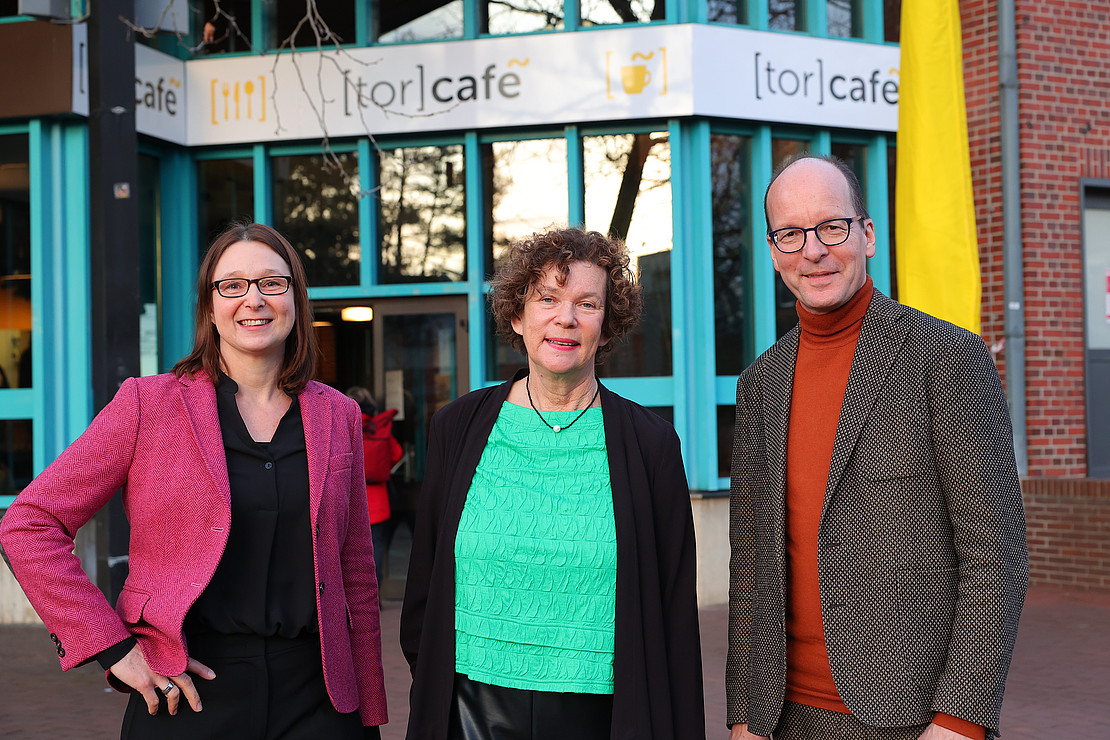This page contains automatically translated content.
50 years of psychological counseling for Kassel students
 Image: Andreas Fischer.
Image: Andreas Fischer.The Studierendenwerk celebrated the 50th anniversary of the PBS yesterday (29. 1.) with an event that impressively showed how important the service is. Guest speaker Prof. Dr. Beate Schücking, President of Deutsches Studierendenwerk (DSW), pointed out in her keynote speech how much the multiple world crises are affecting students:
"Whereas in the past, the focus of psychological counseling was primarily on study-specific concerns such as procrastination, stress management or work organization," said Schücking, "today, dealing with anxiety disorders and depressive moods are the predominant symptoms in psychological counseling."
16 percent of all students, according to the results of the 22nd Social Survey of the Deutsches Studierendenwerk, stated in 2021 that they were affected by at least one health impairment, 65 percent of which were mental illnesses.(www.bmbf.de/sozialerhebung)
Julia Thonfeld, Deputy Managing Director of the Studierendenwerk and also Head of Counselling & Student Financing, and University Chancellor Dr. Oliver Fromm are convinced that the PBS directly helps to prevent students from dropping out. The university helps to fund the advice center. "We know," says Dr. Fromm, "that this is money well spent - the earlier students find ways out of crises with the help of the advice service, the easier it is for them to concentrate on their studies again and secure their academic future."
Securing the future is also a key issue for Thonfeld. She is concerned that the funding of the advice center can be secured in the long term and that students do not have to pay anything if they need help. There are currently five full-time counselors working at the PBS - with a total capacity of 90 counseling hours per week. Last year alone, they received almost 700 new applications and conducted 2,046 one-to-one interviews.
A statement round, in which representatives of students, the university and the PBS team, moderated by HNA journalist Katja Rudolph, looked at the PBS work from a wide variety of perspectives, illustrated how much the entire university landscape benefits from the quick, easily accessible services offered by the counseling center.
Thonfeld emphasized the importance of the shortest possible waiting times for the advice centre: "Anyone who panics and experiences a learning block in view of the upcoming examination phase has no time - quick intervention is needed here." However, according to Thonfeld, this can only be guaranteed with sufficient staffing levels. Only then would the PBS be able to keep pace with the increasing demand for advice.
The conclusion of the birthday celebration was therefore the demand to the federal and state governments to provide the Studierendenwerke with sufficient financial resources for the counseling services in the long term and thus make them future-proof.
Background: Rising registration figures
In 2003, the PBS counted 164 new registrations with 17,284 enrolled students in the winter semester 2002/2003, ten years later there were 391 new registrations with 22,084 students in the winter semester 2012/2013, in 2023 the number of new registrations rose to 689 with 23,006 students in the corresponding winter semester 2022/23.
In addition to individual consultations, the Counseling Center offers mental health workshops on a wide range of topics, from relaxation techniques for stress and social media addiction to dealing with grief or suicidal tendencies.
"We are there for many of the students' concerns - often just a few one-to-one sessions can help them find a way out of their crisis. If necessary, we also refer them to therapists in private practice," says psychologist and PBS employee Katja Hoffmann.